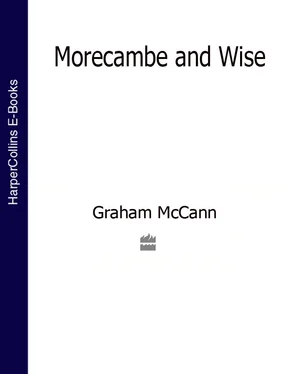The world of Morecambe and Wise – even after the former had decamped to Harpenden and the latter to Peterborough – remained the comic world of the traditional Northern humorist. This world was peopled by sad-faced, snail-paced, put-upon pedants like Robb Wilton’s fire chief (‘Oh, yes, oh aye, it’s a pretty big fire … should be, by now … oh, and I say, Arnold – Arnold – take the dog with you, it’ll be a run for him. He hasn’t been out lately … Oh, good gracious me, what’s the matter with the engine?’ 12), tactless busybodies like Norman Evans’ Auntie Doleful (‘You what? You’re feeling a lot better? Ah, well, you never know – I mean, there was Mrs White – it were nobbut last Thursday, you know – she was doin’ nicely, just like you are, you know – and all of a sudden she started off with spasms round the heart – she went off like a flash of lightning on Friday. They’re burying her today.’ 13), inveterate gossips like Evans’ Fanny Fairbottom (‘That woman at number seven? Is she? Gerraway! Well, I’m not surprised. Not really. She’s asked for it … I knew what she was as soon as I saw her … And that coalman. I wouldn’t put it past him, either … Not since he shouted “Whoa” to his horse from her bedroom window …’ 14) and spiky geriatrics like Frank Randle’s permanently louche octogenarian (‘I’m as full of vim as a butcher’s dog – I’m as lively as a cricket. Why I’ll take anybody on of me age and weight, dead or alive.’ 15).
This was a world where harsh reality intruded rudely into the most rhapsodic of disquisitions, forever dragging idle dreamers like Les Dawson’s Walter Mittyish ex-Hoover salesman back down to earth:
Last evening, I was sitting at the bottom of my garden, smoking a reflective cheroot, when I chanced to look up at the night sky. As I gazed, I marvelled at the myriad of stars glistening like pieces of quicksilver cast carelessly on to black velvet. In awe, I watched the waxen moon ride like an amber chariot across the zenith of the heavens, towards the ebony void of infinite space, wherein the tethered bulks of Jupiter and Mars hung forever festooned in their orbital majesty. And as I stared in wonderment, I thought to myself... I must put a roof on this outside lavatory. 16
This was a world in which marriage was regarded as two becoming one with forty years to determine which one it was. Al Read’s many vivid scenes featuring the desperately active wife and the deviously slothful husband captured the struggle memorably:
| WIFE |
Are you going to cut that grass or are you waiting till it comes in the hall? |
| HUSBAND |
Er, what d’you mean, love? |
| WIFE |
That garden’s a disgrace! You don’t seem to have any interest in it at all. First time the neighbours see you with a pair of shears in your hand they’ll swear you’re out for bother! And shift your feet – I’ve asked you to fill that coal bucket twice and you’ve cracked on you’ve not heard me! What we weren’t going to have in that garden – hanging baskets, a lily pond and goodness knows what! And what have we got? An air-raid shelter full of water and a tin hat with a daisy in it! |
| HUSBAND |
Now, what time have I – |
| WIFE |
Finds time next door! He’s made some beautiful shapes out of his privets – love birds and all sorts. I wouldn’t care, but he always does our hedge up to the gate. The only time I got you to do his, you went and cut the tail off his peacock! |
| HUSBAND |
Well, I gave it ’im back! 17 |
The Northern music-hall favoured the comedy of recognition, inclusive rather than exclusive in its attitude. ‘The traditional northern comic gets great sympathy,’ remarked James Casey (a writer and producer of radio comedy for the BBC’s North Region). ‘The southern comics didn’t get sympathy – they were smart, they would basically tell you how they topped somebody … The northern comedian [in contrast] would tell you how he was made a fool of.’ 18
At the centre of this world stood – a little unsurely at times – the great comic from Stockton-on-Tees, Jimmy James, a lugubrious and vaguely melancholic figure with gimlet eyes and protruding, cushiony lips. He usually found himself sandwiched between two prize idiots – Hutton Conyers on one side, Bretton Woods on the other. ‘Are you puttin’ it around that I’m barmy?’ one of them would ask him. ‘Why?’ James would reply. ‘Did you want to keep it a secret?’ Playfully indulgent, he would listen politely to his companions as they talked their way deeper into the depths of illogicality, rambling on about keeping man-eating lions in shoe-boxes and receiving sentimental gifts from South African trips. Sometimes he would interpose the odd supportive observation (‘Oh, well … they’re nice people, the Nyasas. I’ll bet they gave you something.’), or register a mild sense of surprise ( ‘Pardon?’ ), while pursuing a policy of divide and rule by encouraging the idiot on one side to think that the real idiot was on the other side (‘Dial 999 – somebody must be looking for him! … Go and get two coffees – I’ll try and keep him talking.’ 19).
These triangular conversations would be revived on television in the seventies whenever a special guest would wander on to the stage to join Morecambe and Wise, with the guest on one side, Ernie on the other, and Eric, always running things, in the middle:
| ERIC |
( looking up at Vanessa Redgrave ) Good lord! Are you on a box or ( glancing down at Ernie ) is he standing in a hole? |
| ERNIE |
Eric – Miss Redgrave … |
| ERIC |
( kissing her hand ) Vanilla, how are you? |
| REDGRAVE |
Vanessa. |
| ERIC |
Oh? ( kisses hand again ) Tastes like vanilla. We had your dad on one of our shows, you know. |
| REDGRAVE |
He’s never forgotten it. |
| ERNIE |
They never do. |
| ERIC |
Very talented man, your dad. The way he played those spoons up and down his legs! Fantastic! Dessert spoons as well – they can be painful if you miss … |
‘Whenever you hear me using any of your dad’s material,’ Eric Morecambe told Jimmy James’s son, ‘there are two reasons. One is because it’s a kind of tribute, and the other is because it’s very funny. But mostly’, he added, ‘it’s because it’s very funny.’ 20All of the other old routines were drawn on for very much the same reason: they still seemed very funny.
‘Look at that,’ Robb Wilton is reputed to have said, watching from the wings as an acrobatic troupe clambered up on to each other’s shoulders, balanced themselves on chairs that were in turn balanced on tall poles and then spun themselves around at a dizzying speed. ‘All that’, muttered Wilton, shaking his head incredulously, ‘just because the buggers are too lazy to learn a comic song.’ 21The same sly irreverence, the same effortless timing, the same sharp response to someone else’s airs and graces, could be found, all those years later, in Eric Morecambe’s remorseless teasing of Ernie Wise’s pretensions to being part of something altogether grander than a mere cheap music-hall act.
Early on in their shared career, when their prospects seemed bleak, Ernie Wise was heard to complain: ‘We’re Northern … You can’t win if you’re Northern.’ 22He could not, as far as the future of Morecambe and Wise was concerned, have been more wrong.
CHAPTER II
Morecambe before Wise
I’m an enigma, a one-off.
ERIC MORECAMBE
Читать дальше











![Brian Thompson - A Monkey Among Crocodiles - The Life, Loves and Lawsuits of Mrs Georgina Weldon – a disastrous Victorian [Text only]](/books/704922/brian-thompson-a-monkey-among-crocodiles-the-life-thumb.webp)
